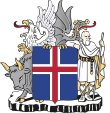
The Free Democratic Party is a liberal political party in Germany.
Sinn Féin is an Irish republican and democratic socialist political party active in both the Republic of Ireland and Northern Ireland.
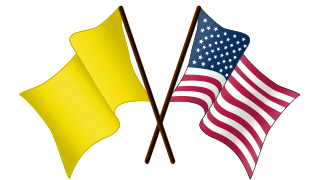
The Libertarian Party (LP) is a libertarian political party in the United States that promotes civil liberties, non-interventionism, laissez-faire capitalism, and limiting the size and scope of government. The world's first explicitly libertarian party, it was conceived in August 1971 at meetings in the home of David F. Nolan in Westminster, Colorado, and was officially formed on December 11, 1971, in Colorado Springs. The organizers of the party drew inspiration from the works and ideas of the prominent Austrian school economist Murray Rothbard. The founding of the party was prompted in part due to concerns about the Nixon administration's wage and price controls, the Vietnam War, conscription, and the introduction of fiat money.
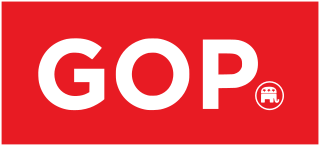
The Republican Party, also known as the Grand Old Party (GOP), is one of the two major contemporary political parties in the United States. It emerged as the main political rival of the then-dominant Democratic Party in the 1850s, and the two parties have dominated American politics since then.

Presidential elections were held in the United States on November 5, 1996. Incumbent Democratic President Bill Clinton and his running mate, incumbent Democratic Vice President Al Gore were re-elected to a second and final term, defeating the Republican ticket of former Senate Majority Leader Bob Dole and former Secretary of Housing and Urban Development Jack Kemp and the Reform ticket of businessman Ross Perot and economist Pat Choate.
The Conservative and Unionist Party, commonly the Conservative Party and colloquially known as the Tories, is one of the two main political parties in the United Kingdom, along with the Labour Party. The party sits on the centre-right to right-wing of the political spectrum. Following defeat by Labour in the 2024 general election, it is currently the second largest political party by the number of votes cast and number of seats in the House of Commons, followed by the Liberal Democrats. As the second largest party, it has the formal parliamentary role of the Official Opposition. It encompasses various ideological factions including one-nation conservatives, Thatcherites, and traditionalist conservatives. There have been twenty Conservative prime ministers. The party traditionally holds the annual Conservative Party Conference during party conference season, at which senior Conservative figures promote party policy.
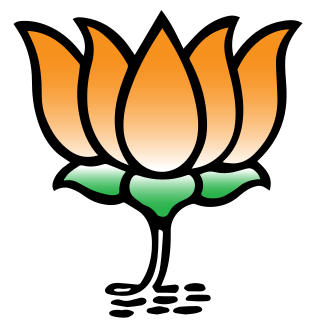
The Bharatiya Janata Party is a political party in India and one of the two major Indian political parties alongside the Indian National Congress. BJP was born out from Syama Prasad Mukherjee's Bharatiya Jana Sangh. Since 2014, it has been the ruling political party in India under the incumbent Prime Minister Narendra Modi. The BJP is aligned with right-wing politics and has close ideological and organisational links to the Rashtriya Swayamsevak Sangh (RSS), a far-right paramilitary organisation. Its policies adhere to Hindutva, a Hindu nationalist ideology. As of January 2024, it is the country's biggest political party in terms of representation in the Parliament of India as well as state legislatures.

The Indian National Congress (INC), colloquially the Congress Party or simply the Congress, is a political party in India with deep roots in most regions of India. Founded on 28 December 1885, it was the first modern nationalist movement to emerge in the British Empire in Asia and Africa. From the late 19th century, and especially after 1920, under the leadership of Mahatma Gandhi, the Congress became the principal leader of the Indian independence movement. The Congress led India to independence from the United Kingdom, and significantly influenced other anti-colonial nationalist movements in the British Empire.

The Communist Party of India (Marxist) (abbreviated as CPI(M)) is a communist political party in India. It is the largest communist party in India in terms of membership and electoral seats, and one of the six national parties of India. The party was founded through a splitting from the Communist Party of India in 1964 and it quickly became the dominant faction.

Presidential elections were held in the United States on November 2, 2004. Incumbent Republican President George W. Bush and his running mate, incumbent Vice President Dick Cheney, were re-elected to a second term. They narrowly defeated the Democratic ticket of John Kerry, a senator from Massachusetts, and his running mate John Edwards, a senator from North Carolina.
An independent, non-partisan politician, or non-affiliated politician is a politician not affiliated with any political party or bureaucratic association. There are numerous reasons why someone may stand for office as an independent.

The Liberal Democrats are a liberal political party in the United Kingdom, founded in 1988. They are based at Liberal Democrat Headquarters, in Westminster, and the current leader of the party is Ed Davey. They are the third-largest party in the United Kingdom, with 72 members of Parliament (MPs) in the House of Commons. They have 77 members of the House of Lords, four members of the Scottish Parliament, one member in the Welsh Senedd, and more than 3,000 local council seats. The party holds a twice-per-year Liberal Democrat Conference, at which party policy is formulated. In contrast to its main opponents' rules, the Liberal Democrats grant all members attending its Conference the right to vote on party policy, under a one member, one vote system. The party also allows its members to vote online for its policies and in the election of a new leader.
The Labour Party is a political party in the United Kingdom that sits on the centre-left of the political spectrum. The party has been described as an alliance of social democrats, democratic socialists and trade unionists. It is one of two dominant political parties in the United Kingdom, along with the Conservative Party. The party has been led by Keir Starmer since 2020, who became Prime Minister of the United Kingdom in July 2024. Since the 2024 general election, the Labour Party has been the governing party of the United Kingdom and the largest political party in the House of Commons, followed by the Conservative Party and the Liberal Democrats. As of 2024, there have been seven Labour prime ministers and fourteen Labour ministries. The party traditionally holds the annual Labour Party Conference during party conference season, at which debates and voting take place, and senior Labour figures promote party policy.
The New Democratic Party is a federal political party in Canada. Widely described as social democratic, the party sits at the centre-left to left-wing of the Canadian political spectrum, with the party generally sitting to the left of the Liberal Party. The party was founded in 1961 by the Co-operative Commonwealth Federation (CCF) and the Canadian Labour Congress (CLC).

Presidential elections were held in the United States on November 6, 2012. Incumbent Democratic President Barack Obama and his running mate, incumbent Vice President Joe Biden, were elected to a second term. They defeated the Republican ticket of former Governor of Massachusetts Mitt Romney and U.S. Representative Paul Ryan of Wisconsin, who later became Speaker of the House of Representatives.

The election of the president and for vice president of the United States is an indirect election in which citizens of the United States who are registered to vote in one of the fifty U.S. states or in Washington, D.C., cast ballots not directly for those offices, but instead for members of the Electoral College. These electors then cast direct votes, known as electoral votes, for president and for vice president. The candidate who receives an absolute majority of electoral votes is then elected to that office. If no candidate receives an absolute majority of the votes for president, the House of Representatives elects the president; likewise if no one receives an absolute majority of the votes for vice president, then the Senate elects the vice president.
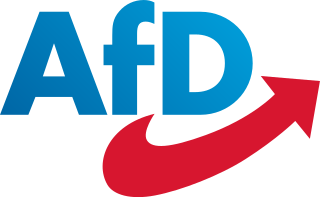
Alternative for Germany is a far-right and right-wing populist political party in Germany. The AfD is Eurosceptic, and opposes immigration into Germany, especially Muslim immigration. The name of the party reflects its resistance to policies of Angela Merkel with her insistence on Alternativlosigkeit. The Federal Office for the Protection of the Constitution, Germany's domestic intelligence agency, has classified the party as a "suspected extremist" organisation.

Reform UK is a right-wing populist political party in the United Kingdom. Nigel Farage has served as the party's leader since June 2024 and Richard Tice has served as the party's deputy leader since July 2024. The party currently has five members of Parliament (MPs) in the House of Commons and one member of the London Assembly. The party also holds representation at the local government level, with most of its local councillors having defected from the Conservative Party to Reform UK. Following Farage's resumption of the leadership during the 2024 general election, there was a sharp increase in support for the party. Following the election, it was the third largest party by popular vote, with 4,117,610 votes achieving 14.3 per cent of the vote in total.
